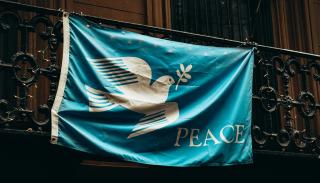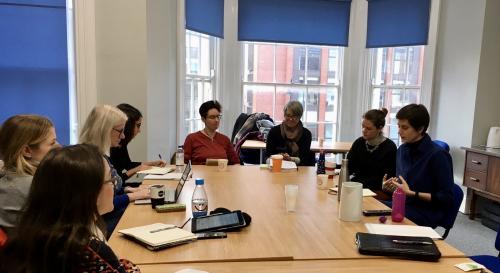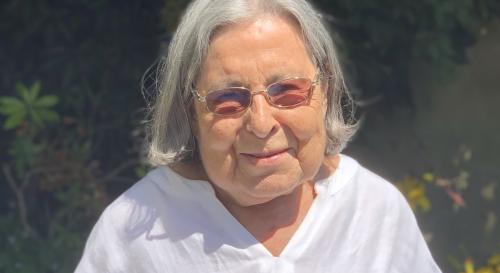
Breadcrumbs navigation
Making peace within hierarchy: seeing international peacemaking, world order and history from Cameroon
Jacqui Cho discusses the key arguments from her new Review of International Studies (RIS) article. If you'd like to know more you can read the full article here - Making peace within hierarchy: Seeing international peacemaking, world order, and history from Cameroon.
For decades, peace mediation has predominantly operated under the rational actor model, emphasising material interests and needs within frameworks of interest-based bargaining. This article builds on the growing recognition of the importance of identities and worldviews in mediation, highlighting the critical yet often-overlooked role of actors’ self-conceptions – how they see the world and their place within it – in shaping peace processes. In doing so, it illustrates how misalignments between the worldviews of mediators and conflict parties may complicate efforts to resolve conflicts.
As the first explicit attempt to bridge the literatures on the world order – particularly the anarchy versus hierarchy debate – and peacemaking, the article introduces hierarchy as a useful analytical lens to unpack power dynamics in international mediation. Drawing on Historical International Relations and reverse ethnography, the analysis situates peacemaking endeavours within conflict parties' deeply held understandings of global structures, using Cameroon’s engagement with Western mediators in the Anglophone Crisis as a case study. In offering a more historically conscious account of conflict parties’ interests, the article draws on the literature examining the entanglements of race, eurocentrism, and knowledge production.
The analysis foregrounds two dominant themes in Cameroonian perspectives – hierarchy and hypocrisy – and explores their implications for mediation processes. It argues that concerns around self-image, status, and symbolic positioning cannot be dismissed as “irrational” or “overly sensitive” but serve as powerful drivers of behaviours. Mediation is not only a platform for negotiating the end of violence, but also as an opportunity for conflict parties to position themselves on the global stage. Against this backdrop, the Swiss facilitation process (2019-2022) was interpreted in Cameroon through the lens of longstanding perceptions of world order – marked by hierarchy and hypocrisy – which, in turn, shaped how different Cameroonian actors assessed their priorities and engagement with the process.
Hierarchy and the shadow of history: “Macron is coming to put things in place”
For many Cameroonians, the global order continues to be perceived as deeply shaped by colonial legacies. Resentment toward former colonial powers, especially France and Britain, as well as international bodies like the United Nations, permeates popular and official discourse, often linking these actors directly to the ongoing Anglophone Crisis. Material manifestations of colonial legacy, such as the CFA franc and French economic influence, reinforce perceptions of enduring hierarchy, while ideational elements, exemplified by the perceived persistence of French influence through elite institutions like the National School of Administration and Magistracy (ENAM), also contributes to these sentiments. In recent years, the recognition of the historical hierarchies experienced by Africa and the desire to address their persistence have become increasingly prominent in Cameroonian state rhetoric.
Charges of hypocrisy: “The West’s double standards will come back to stab them”
Alongside hierarchy, Cameroonians across the political and conflict divides express acute awareness and frustration with what they view as Western hypocrisy. Here, it is noteworthy that perceived inconsistencies in Western policies, particularly in areas seemingly unrelated to the Anglophone Crisis, strengthen such perceptions and inform Cameroonian attitudes towards mediation processes. Two commonly cited examples include:
- Europe's migration policies: Critiques highlight Europe's responses to the so-called refugee crisis since 2015 as hypocritical and inhumane, contradicting its professed humanitarian values.
- Selective attention to conflicts: Different international responses to the Ukraine war versus conflicts in Africa fuel perceptions that African lives are undervalued. These claims are echoed by both government representatives and armed group members.
Cognisant of these widely shared perceptions, the Cameroonian state has strategically mobilised such discourses to justify their decisions, including its withdrawal from the Swiss facilitation process. Refusing to engage in the Swiss process was at once framed – and resonated domestically – as resisting foreign imposition, calling out the West’s double standards, and contesting their expected subordinate position in the world order.
Swiss facilitation: misaligned worldviews and the imperative of "saving face"
Cameroon’s engagement with the Swiss facilitation process was significantly shaped by prevailing perceptions of hierarchy and hypocrisy. Switzerland’s self-image as a neutral, non-colonial mediator stood in stark contrast to popular and official Cameroonian views of Switzerland as inherently part of "the West" that had been historically accused of masking economic interests and racism behind neutrality.
This misalignment led the Swiss facilitation team and the broader Western diplomatic community to interpret Cameroon's behaviour as irrational or overly sensitive. From the Cameroonian perspective, however, these actions were rational, deliberate, and coherent attempts to assert strength in the global stage and avoid the reputational damage associated with “losing face”.
Several incidents underscore these dynamics:
- Public announcement: The Swiss Federal Department of Foreign Affairs’ press release announcing its role as a facilitator caught several Cameroonian government officials off guard. While this is unsurprising when one considers the fragmentation in the top echelons of the Cameroonian state, this bred resentment among those who perceived the process to have been imposed on Cameroon. Given pre-existing anxieties around the West’s imposition of their preferences, the perception of a Western state interfering in “internal affairs” struck a particular nerve.
- Geneva demonstrations: Protests against President Biya in Geneva were portrayed in Cameroonian media as a humiliation, intensifying concerns over losing face internationally. Given how being “embarrassed”, closely associated with losing face, is something to be absolutely avoided, these early developments signalled to officials in Yaoundé that the Swiss process might undermine, rather than enhance, Cameroon’s global standing.
- Perceived Swiss arrogance: The prolonged absence of a Swiss ambassador in Yaoundé during the facilitation process was interpreted as a sign of disrespect, exacerbating suspicions that Switzerland lacked genuine commitment or regard for Cameroonian concerns.
Initially viewed by Yaoundé as an opportunity to enhance international prestige, the Swiss process lost traction as these expectations clashed with perceived slights and embarrassments. The Cameroonian government consequently adopted a strategy of quiet resistance, marked by silence and ambiguity, an approach rational from their hierarchical worldview, resisting perceived Western imposition.
Applying reverse ethnography in peace mediation
The article calls for the integration of reverse ethnography into the practice of peace mediation, encouraging mediators to examine their own roles, identities, and practices through the eyes of those typically positioned as the subjects of mediation. Reversing the gaze – considering and centring how non-Western actors perceive Western mediators –, reverse ethnography offers a powerful tool for challenging ethnocentrism and exceptionalism. It also aligns with the broader call for a Global International Relations that transcends the problematic divide between the so-called “West” and “Rest”.
In contexts characterized by historical grievances and significant power disparities, mediators’ critical self-reflexivity is imperative so as to avoid unintentionally echoing colonial dynamics. Rather than relying on a self-referential understanding of oneself, mediators should engage in sincere efforts to understand the multifaceted, including uncomfortable, ways in which they are perceived, both prior and throughout their engagement. Such an approach would help foster greater self-awareness, which is essential in what is, by definition, a relational exercise involving extremely high stakes.
Contributions to the field
This research offers several key contributions to the scholarship on peace mediation and International Relations theory:
- Bridging world order and peacemaking: Bringing together theoretical discussions of the world order, particularly hierarchy, and an empirical mediation case, the article demonstrates the analytical value of hierarchy in understanding power dynamics in peacemaking.
- Centring conflict parties’ perspectives: The article foregrounds Cameroonian interpretations, helping to correct a persistent imbalance in mediation literature that tends to privilege mediator perspectives. In doing so, it underscores the importance of incorporating the agency and worldviews of conflict parties into analyses of peace processes.
- Highlighting race in mediation: Addressing the racial dimensions of mediation, a topic scarcely explored even within critical peacebuilding studies, the paper sheds light on how racial and Eurocentric assumptions influence international mediation efforts.
- Advancing historical IR: The article highlights how past interactions, and long-standing perceptions shape current attitudes toward mediation. It challenges the presentist bias in much of today’s analysis of global politics by showing that conflict parties’ strategies are not only based on future-oriented costs and benefits calculations but are also rooted in historically informed understandings of past engagements and their outcomes.
Read the full article at DOI: https://doi.org/10.1017/S0260210525000257
BISA members receive access to RIS (and to our other journal European Journal of International Security) as a benefit of membership. To gain access, log in to your BISA account and scroll down to the 'Membership benefits' section. If you're not yet a member join today.


